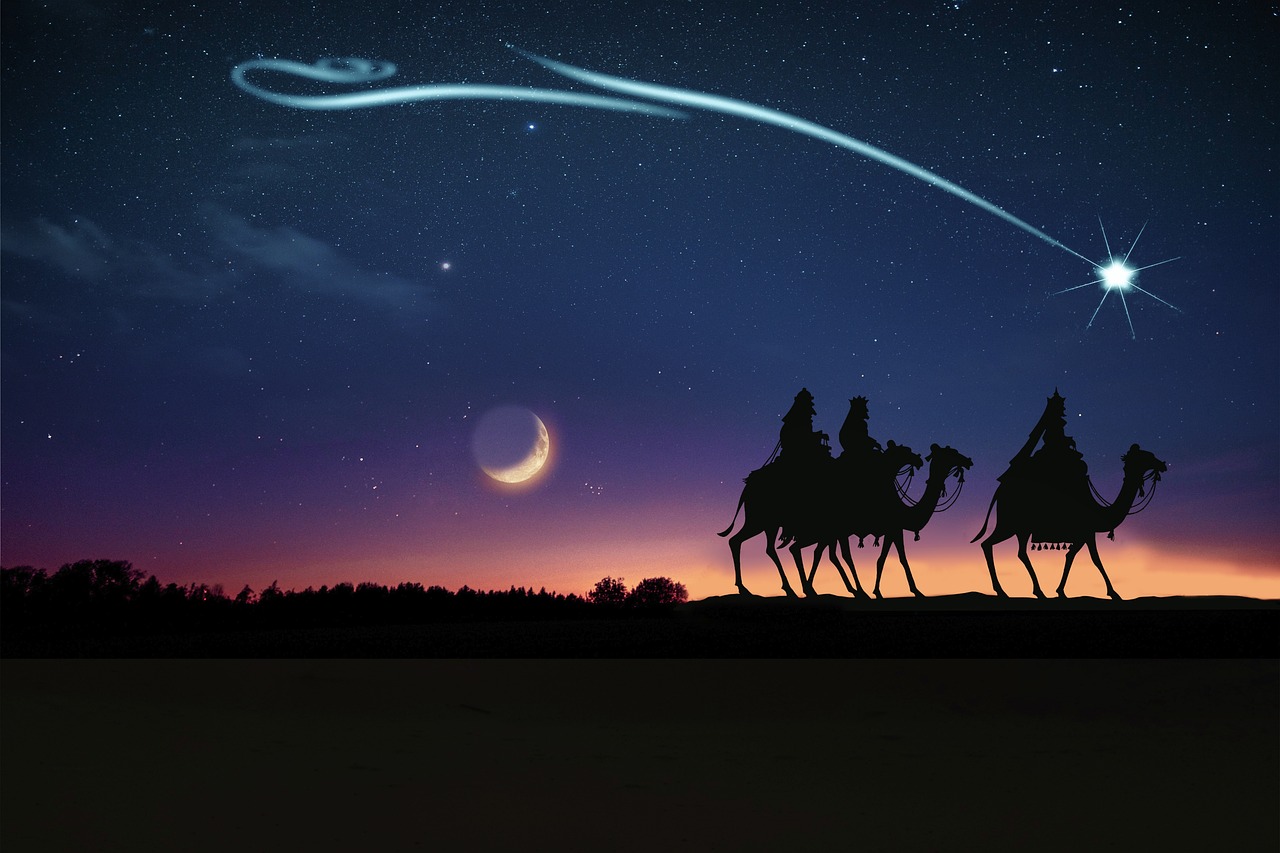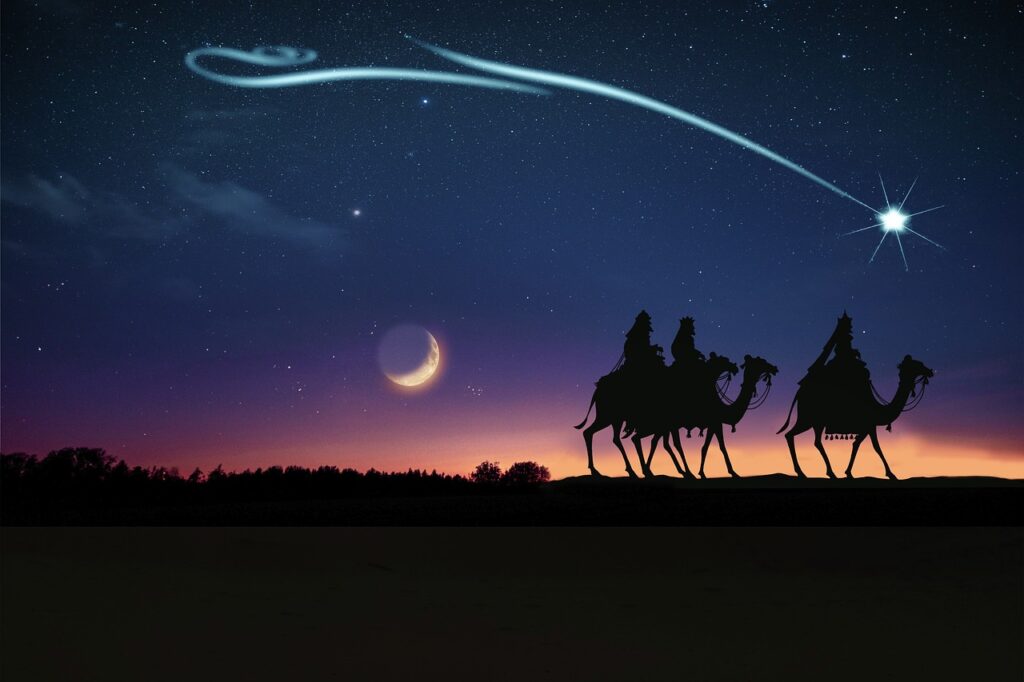They appeared out of nowhere and then disappeared into thin air.
With the lack of facts about who they were and why they were a part of the scene surrounding the birth of Christ, many legends have grown through the centuries about the enigmatic wise men (also called the Magi).
Here’s all we know from the Bible:
After Jesus was born in Bethlehem of Judea in the days of King Herod, wise men from the east arrived unexpectedly in Jerusalem, saying, “Where is He who has been born King of the Jews? For we saw His star in the east and have come to worship Him.”
When King Herod heard this, he was deeply disturbed, and all Jerusalem with him. So he assembled all the chief priests and scribes of the people and asked them where the Messiah would be born.
“In Bethlehem of Judea,” they told him, “because this is what was written by the prophet:
And you, Bethlehem, in the land of Judah, are by no means least among the leaders of Judah: because out of you will come a leader who will shepherd My people Israel.”
Then Herod secretly summoned the wise men and asked them the exact time the star appeared.
He sent them to Bethlehem and said, “Go and search carefully for the child. When you find Him, report back to me so that I too can go and worship Him.”
After hearing the king, they went on their way. And there it was—the star they had seen in the east! It led them until it came and stopped above the place where the child was. When they saw the star, they were overjoyed beyond measure. Entering the house, they saw the child with Mary His mother, and falling to their knees, they worshiped Him. Then they opened their treasures and presented Him with gifts: gold, frankincense, and myrrh. And being warned in a dream not to go back to Herod, they returned to their own country by another route. (Matt. 2:1–12)
That’s it. That’s all we get from Scripture. So for the rest, we have to look further and deduce a few things.
First of all, the words “magi” and “wise men” refer to the same group of men who came to Bethlehem to find the Christ Child, in spite of the fact that Bible translations differ on that point. However, these men got the title of kings (as seen in popular Christmas carols) when early Christian scholars pointed out that perhaps there were messianic prophecies that referred to these travelers.
May the kings of Tarshish and the coasts and islands bring tribute, the kings of Sheba and Seba offer gifts. Let all kings bow down to him, all nations serve him. (Ps. 72:10–11)
Nations will come to your light, and kings to the brightness of your radiance. (Isa. 60:3)
Who Were They?
Many legends have been associated with these guys and many of them we have accepted as truth.
One huge myth is that there were three of them. Conjecture (or deduction) has given us that idea since there were three gifts named in the biblical account: gold, frankincense, and myrrh.
Those gifts, themselves, have been up for much speculation as to their significance. One theory is that each gift was thoughtfully chosen and has deep spiritual meaning, especially in light of who Jesus would become to the world.
Gold was a symbol of royalty. Jesus would be called the King of kings.
Frankincense was incense that was a symbol of deity. He would be called Emmanuel—God With Us.
Myrrh was embalming oil. This could have been a foreshadowing of Jesus’ redeeming death on the cross.
These have no proof but are meaningful to us as believers mostly because of what we now know of Jesus’ life, death, and resurrection.
Just as the nature of the gifts themselves, what happened to them after they were presented to the Christ Child also draws assumptions.
One story says that two thieves, who would later meet Jesus as they flanked Him on the crosses of Calvary, stole the gold. That one seems to be a bit of a stretch.
Another story is that Jesus kept the gifts and gave them to Judas later as part of the treasury that was misappropriated by His betrayer. Possible, I guess. Not likely.
There is also speculation that the myrrh given to Jesus was kept safe and used thirty-three years later to anoint His body for burial. A nice thought.
The most widespread myth is that Joseph sold all of the gifts to finance their escape to Egypt when evil King Herod threatened to kill all the babies in Bethlehem. This is the most practical of the folklore but the least romantic.
The men themselves were as mysterious as their unexpected visit. They are just called “wise men from the east” in Scripture without any clue as to where in the east they lived.
More conjecture.
There is some belief that these men were followers of Zoroaster—a prophet, a sage, and a magician from the eastern part of ancient Iran. This would make some sense and might explain why the wise men were called Magi, a word that has the same Greek origin as the word “magician.”
Early Jewish historian, Josephus, and Greek historian, Herodotus, are among those who tell us that these were priests, perhaps Zoroastrian, who practiced astrology and interpreted dreams. These would be stargazers and therefore the appearance of a new star, that seemed to move no less, would have great importance to these scholars.
By the seventh century, the legend of the “three” wise men gave them names: Gaspar, Melchior, and Balthazar.
When Did They Come?
In almost every Christmas pageant I’ve ever seen or directed, the wise men have proceeded into the scene and have placed their gifts at the feet of a newborn lying in a manger. It’s almost certain that the Magi came years after the birth of Christ. The account in Matthew says that He was a young child and was living in a house, not a stable, and the calculations related to Herod’s discovery of the presence of another King of the Jews makes it somewhere around two years later. After the wise men left Jerusalem, Herod ordered the death of all boys under the age of two, so this is a natural deduction.
As to where the wise men went after they encountered Jesus, Scripture just says that they returned to their own country (Matt. 2:12). We would love to think that they returned believers in the true God and that Jesus was His Son. We would also like to believe that they became missionaries and evangelists in the pagan world from which they came. But, of course, no one really knows.
Why Did They Come?
There is no mystery, however, (indicated in Scripture and history) as to why these men followed a star to Bethlehem bringing gifts.
Entering the house, they saw the child with Mary His mother, and falling to their knees, they worshiped Him. (Matt. 2:11)
There’s no question. No room for conjecture. Worship was their original intent. “For we saw His star in the east and have come to worship Him” (Matt. 2:2). And worship was the final act.
This Christmas, intentionally begin your journey to seek Christ in everything you do and let the journey take you to a place of worship. Don’t let the trappings detour you. Bow down and lay your most precious gifts before Him.


so good… so good… SO GOOD!!!
Excellent! Wow! Thank you!